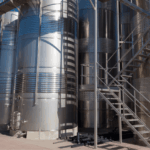Circular Economy Expert
What is a circular economy expert? The term “circular economy” refers to an economy in which generated waste materials are recycled or converted into forms retaining as high value as possible, as opposed to a traditional linear economy where materials are simply put in landfills to decompose at what every rate, if at all. Recycling is part of a circular economy and is not simply reusing the waste products. Many waste products are contaminated – like plastics, some papers, diapers, medical waste, and other industrial waste – and are very difficult to recycle. Sometimes, these wastes can be converted into high-value products by mechanical/physical, thermochemical, or biochemical processes.
Consequently, a circular economy is likely to be based on effective waste conversion technologies – often thermochemical and biochemical processes. Examples of these would be waste-to-energy, waste-to-gas, and gas-to-Liquids technologies. These produce usable products. The use of appropriate waste conversion technologies, sometimes combined with reliable scrubbing or cleaning systems, are a path to a working circular economy. In a true circular economy, the waste is likely to be transformed to various forms of clean energy products like electricity, hydrogen, liquid synthetic fuels, “green” chemicals, and food-based products.
A Circular Economy Expert or consultant will likely have a chemical background and/or engineering background and a working knowledge and experience in a variety of waste conversion technologies. These experts can provide expert advice in things like waste reduction, sustainable product regeneration, and climate change mitigation.
Large renewable energy and biochemical consulting firms like LEC Partners normally offer a wide range of services in biofuels, biochemicals, biotechnologies, biomaterials, synthetic biology commercialization, feedstocks, and hemp/cannabis. These companies should have business and financial services like due diligence, feedstock availability, grants and loans and bio market research. The company also offers technical and engineering related services like techno economic analysis, environmental evaluations, feasibility studies, risk analysis and expert witness engagements. They might also have strategic partnerships in place to assist clients with insurance, legal, accounting, plant fabrication, feedstock procurement.
With over 150 experts worldwide, LEC Partners has experts in many specific clean and renewable areas, including anaerobic digestion, fermentation, biomass, conversion technologies for things like tires and railroad ties, organic synthesis, fuel additives, ethanol gas, biodiesel fuel including algae biofuels, solid state and industrial fermentation, green energy grants, ag biotech, agricultural waste, alcohol fuels, alternative proteins and animal-free products, sustainable foods, beverage fermentation, biocatalysis, biodiesel conversion, biogas production, biomass power, carbon intensity, co2 utilization, combined heat & power, Fischer-Tropsch technology, food waste, hydrothermal carbonization, industrial enzymes, landfill management, microbial fermentation, organic synthesis, plastic pyrolysis, plastic recycling, plastic waste, pyrolysis oil, reactor design, renewable identification number, the Renewable Fuel Standard (rfs2), solid recovered fuels, torrefaction and torrefied biomass, waste to energy, and waste-to-hydrogen. This is a multidisciplinary group of green energy consultants that is a virtual “one stop shop” for any client need and handles projects of all types and sizes.
Look at our experts and the services we provide. Most of our experts are also available to advise and serve as expert witnesses in bioeconomy litigation matters. For the larger projects, we specialize in putting together full service, interdisciplinary teams with one point of contact. See video about LEC here. Call us at 1+ (501) 833-8511 or email us for more information.
Have some questions?
Not sure where to start?
Let's start a conversation. We're here to help you navigate
the bioeconomy with confidence.

